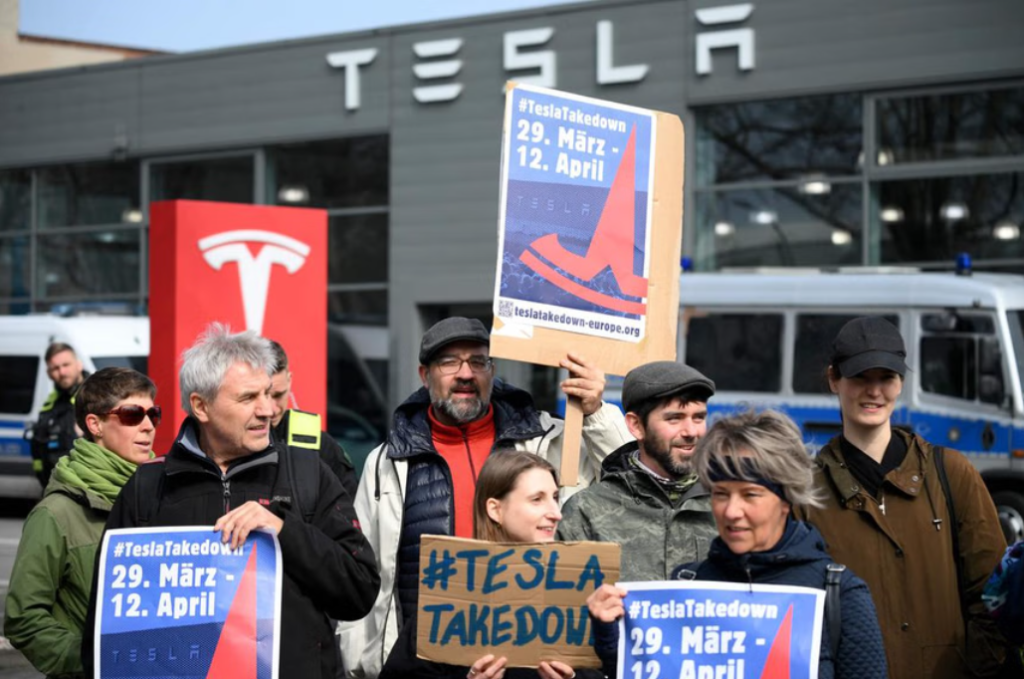LONDON – Rising anti-American sentiment in Europe as US President Donald Trump’s policies ruffle feathers is ushering in a shift in consumer behaviour, not least in attitudes toward American goods.
Mr Trump’s threats to impose punitive tariffs on Europe, seize territories and pull military support in the region – including his handling of the war in Ukraine – have irked European consumers, fuelling campaigns to boycott US products.

There is currently no country in Europe where more than half of the population has a positive attitude towards the US, according to a YouGov poll published March 4. Opinion soured the most in Denmark, where leaders and residents were riled by Mr Trump’s plans to take control of Greenland.
Facebook groups urging the boycott of US goods have sprung up and amassed thousands of followers. One such Danish group, Boykot varer fra USA (Boycott products from USA) has drawn more than 92,000 members since it was created on Feb 3.
“I got more and more upset with his ways of declaring what is right and what is wrong,” Mr Bo Albertus, one of the administrators of the group, said in an interview. “I began to feel like I need to do something.”
Mr Albertus, a Danish school principal, said he cancelled all his streaming services in favour of European or Danish ones and no longer eats at American fast-food chains.
“I thought the best way is to stop putting money in their pockets,” Mr Albertus said. Almost every second Dane has deliberately refrained from buying an American product since Mr Trump’s inauguration, a survey from Megafon for Danish broadcaster TV 2 shows.
A similar Swedish group, Bojkotta varor fran USA, has grown just as fast.
“I was just angry, I didn’t know what to do,” said Ms Jannike Kohinoor, a Swedish teacher and one of the creators of the group.
Following Mr Trump’s insinuations that Ukrainian President Volodymyr Zelensky was to blame for the war, “our brains were just exploding”, she said. “Starting the group gave us an opportunity to do something.”
Some 70 per cent of Swedes have or are considering refraining from buying American products as a form of political protest, according to a survey from Verian conducted for Swedish state broadcaster SVT. One in 10 have boycotted US goods completely within the past month, while 19 per cent have only stopped buying certain goods.
Salling Group, Denmark’s largest grocery group and the operator of supermarkets Bilka, Fotex and Netto, started marking whether a product is owned by a European company on its electronic price tags.
That was in response to an increasing number of customers wanting to buy groceries from exclusively European brands, chief executive Anders Hagh said in a LinkedIn post.
Still, said Bloomberg Intelligence senior analyst Charles Allen, any visible impact on European retail earnings would take a while to materialise. “These market share shifts tend to take time.”
A growing number of US companies, already rattled by boycotts in Canada, have flagged the potential business risk of more discontent further afield.
The change in consumer behavior has been swift and dramatic for Tesla, fueled by Europeans’ reaction to CEO Elon Musk’s antics and unwelcome involvement in European politics.
Tesla’s sales plunged 76 per cent in Germany in February as Mr Musk angered voters taking part in the country’s closely contested federal election.
Across Europe, sales of Tesla vehicles fell 45 per cent in January and dropped 40 per cent in February.
Groupe Roy Energie, which has ordered between five and 15 Tesla cars annually since 2021, took a stand by cancelling an order of 15 cars in favour of European models despite their higher cost.
“Individual consumers, society, our countries, Europe must react,” the company’s CEO Romain Roy told French broadcaster Sud Radio.
In Norway, oil and shipping company Haltbakk Bunkers said it would no longer sell fuel to US forces or ships, a reaction to the Oval Office spat between Mr Trump and Mr Zelensky, according to public broadcaster NRK. “No fuel for Americans!” the company said in a now-deleted Facebook post.
The reports prompted Norway’s Defence Minister Tore O. Sandvik to issue a statement saying that the reported boycott is not in line with Norwegian government policy.
At the grassroots level, it’s about doing what one can.
“I don’t know if we’re going to have an economic impact, I think that’s longer than a marathon,” Ms Kohinoor said. “But maybe we can have a social impact.” BLOOMBERG
Reprinted from The Straits Times

